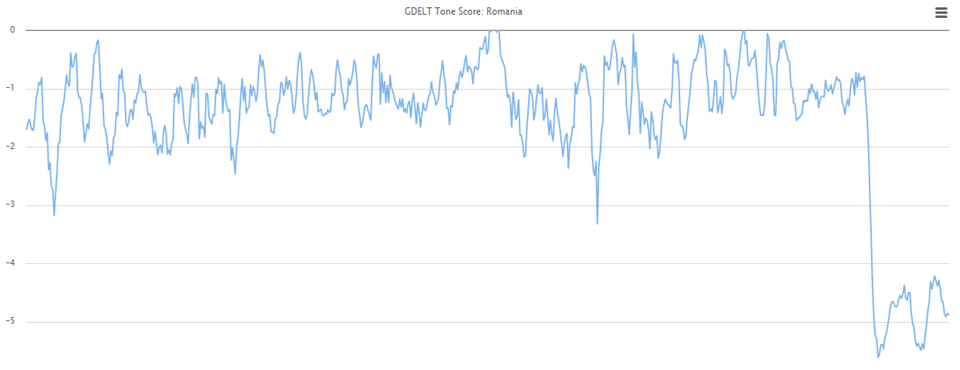Daily life across the planet involves an incredible array of activities that can impact the overall "stability" and "mood" of a country, but not all of these may be recorded as "events" in GDELT. The GDELT Event Database uses at its core a taxonomy of around 300 categories of "events" from riots and coups to peace appeals and diplomatic exchanges developed by the political science community over more than a decade and drawing from a rich body of previous work. However, like most political science event taxonomies, it tends to focus on major socio-political activities identified by the academic and defense communities as being of particular relevance to the study of societal stability.
This means, however, that the event database will not ordinarily encode situations such as a civilian plane crash or mass casualty nightclub fire. Even for categories of events it does record, it may note that the victim of an attack was a journalist, but such factual event records alone cannot capture the significance of a particular event to a particular society given the ongoing and evolving context in which it occurs.
This is where the emotional data recorded by GDELT is extremely powerful in that, among the thousands of dimensions that GDELT assesses from each news report, the "tone" of coverage about a country offers a powerful synthesis of the overall environment, capturing highly negative events and reactions, regardless of whether they are recorded in the event database and assessing the context and impact of those events it does record. This is why the new GDELT Stability API offers both an event-based "instability" measure and a "tone" measure that assesses how positive or negative coverage about a country is, regardless of recorded events involving that location.
For example, the Stability API Tone timeline for Romania over the last 7 days, seen below, shows the sharp plunge towards negative tone as the first reports emerged about the massive nightclub fire there, as well as the ebb and flow of new information about the disaster. A fire at a nightclub is unlikely to leave a measurable signature in the "instability" timeline drawn from the GDELT Event Database, but here is clearly visible is the "tone" of coverage about Romania.
Similarly, the terrible tragedy of the Russian plane crash in Egypt this morning can be clearly seen in the two timelines below, one of Russia (whose citizens appear to have accounted for most of the passengers and where the plane was heading) and of Egypt (where the plane crashed).
Finally, the significance of the two attacks this morning on the publishing industry in Bangladesh is seen in the timeline below of tone of coverage about Bangladesh. From a factual standpoint, four civilians were attacked, one hacked to death and three shot and stabbed, two of which were publishers and two of which were authors. Yet, these attacks hold tremendous significance within the current societal climate of the country in that both of the publishers had published works by Avijit Roy, who had himself been hacked to death earlier this year. Four previous attacks targeted atheist bloggers, with the Islamic State claiming responsibility for some of the attacks, and all of the violence has been occurring against the backdrop of fears of the rise of radical Islam within the country.
While the factual event records relating to all of these attacks would simply show civilians being killed or wounded, the tone timeline below captures the far greater societal significance of the attacks, situating them in the overall emotional state of the nation.
Thus, when using the new GDELT Stability API, it is important to recognize the very different dimensions of global society reflected in the "instability" and "tone" measures and the complementary lenses they offer onto the current state of the world. Tone in particular can be a very useful metric for understanding the general state of a nation and the impact and significance of evolving situations.
